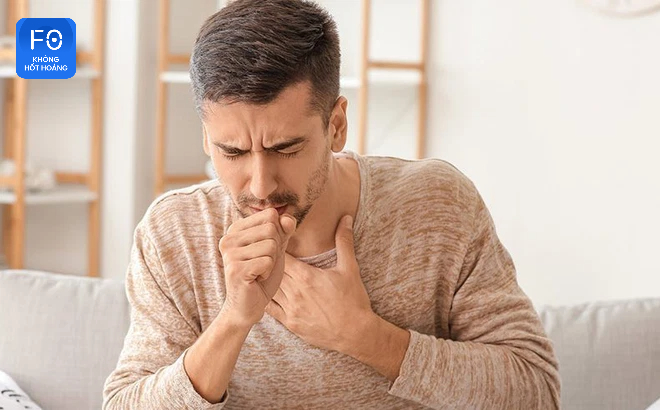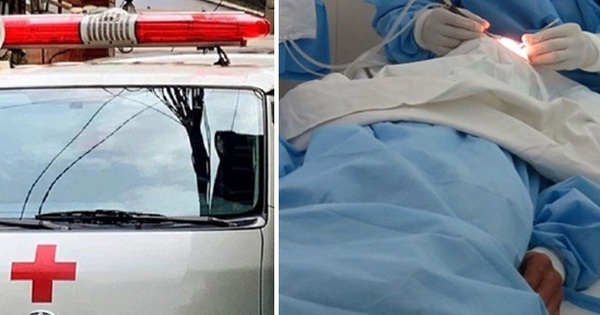Coughing is a symptom that can alienate many people, especially during the COVID-19 pandemic.
Coughs can last for weeks or months after a person recovers from COVID-19. About 2.5% of people still have a cough a year after being infected with COVID-19, according to an article by associate professor Natasha Yates, Bond University, Australia, published on The Conversation.
Recurrent coughs can reduce your ability to work, cost treatment, and make you afraid to participate in social activities.
As a general practitioner, Associate Professor Natasha Yates has been asked by many patients how to overcome their post-COVID cough. Below is the answer of Dr. Yates.

Recurrent coughs can reduce your ability to work, cost treatment, and make you afraid to participate in social activities. (Illustration)
What is the cause of post-COVID?
It is not surprising that COVID causes coughing, as the SARS-CoV-2 virus affects the respiratory tract, from the nose to the lungs.
Coughing is one of the body’s ways of getting rid of unwanted irritants like viruses, dust, and mucus. When something “foreign” is detected in the respiratory tract, a reflex is activated to induce coughing, helping to clear the irritant out.
While this is an effective defense mechanism, it is also how viruses are spread. This is one of the reasons why the SARS-CoV-2 virus has spread around the world effectively and quickly.
Why does coughing persist after COVID?
Inflammation is a defensive process our immune system uses to fight COVID-19. Inflamed tissues swell and release fluid. This can last a long time, even after the virus is gone.
Coughing can persist for four main reasons, all of which are related to inflammation:
If the upper airways (nose and sinuses) remain inflamed, the fluid produced will flow down the back of the throat, causing a “postnasal drip”. This makes you feel the need to “clear your throat,” swallow, and/or cough.
If the lungs and lower airways are affected, coughing is the body’s way of trying to clear the fluid and swelling there. Sometimes there isn’t much fluid (hence a “dry cough”), but the swollen lung tissue still causes a cough.
Nerve pathways can be hiding places for inflammation. This means that the nervous system will be affected and the cough will not occur due to the respiratory tissues.
A less common but more serious cause is scarring of lung tissue from inflammation, a condition known as “interstitial lung disease”. This disease needs to be diagnosed and managed by a respiratory specialist.
Interestingly, F0 can experience a range of post-COVID symptoms, including coughing, whether or not they are sick enough to be hospitalized. Some patients told Dr. Yates that they were fine during their COVID-19 infection, but the cough after coming back negative is driving them crazy.

Coughing is one of the body’s ways of getting rid of unwanted irritants like viruses, dust, and mucus. (Illustration)
When should I go to the doctor?
We need to be careful not to assume that our cough is post-COVID-19 and miss out on other serious causes of a chronic cough.
Besides COVID, one thing to watch out for is secondary bacterial infection. Signs you may have a secondary bacterial infection include:
– change in cough pattern (cough sounds different, more frequent)
– changes in sputum (increased volume, bloody)
– develop new symptoms such as fever, chest pain, heart palpitations or, worse, difficulty breathing.
Other potentially serious illnesses that can cause a chronic cough are heart failure and lung cancer, so if you’re in doubt about the cause of your cough, get yourself checked out.

Gargling with salt water, nasal spray… can help relieve cough.
How to relieve cough effectively
If the cough is mainly caused by postnasal drip, you can apply measures such as gargling with salt water, nasal spray …
In addition, you also need to drink enough water, try using honey to soothe the throat.
If the cause of the cough is an infection in the lungs, breathing exercises can control the cough. Inhaling steam (during a hot shower or through a steam generator) can help.
Conclude
A post-COVID cough can last for weeks, be exhausting, and have many causes. Most treatments are simple, inexpensive, and doable without medical intervention.
However, if you have any doubts about the cause or progression of your cough, you should see your doctor for an examination.
(Source: The Conversation)
Invite readers to watch the livestream “Recognize cancer before it’s too late”
Cancer is a global burden, claiming the lives of millions of people and costing hundreds of millions of dollars for treatment. Early detection of cancer plays a decisive role in successful treatment and prolongs life for patients.
To help people understand the dangers of cancer, the common early symptoms and how to distinguish these symptoms from the manifestations of other common conditions, the program “It’s difficult to have a doctor” organized an online discussion with the topic “Knowing cancer before it’s too late”.
The program has the participation of Dr.BS. Nguyen Quang Hung, Deputy Director of the Center for Oncology and Nuclear Medicine, Bach Mai Hospital and broadcast at 2:30 p.m., March 31 on fanpage. Soha.vn.
We invite you to watch the show!
Invite readers to ask questions about the program HERE.
at Blogtuan.info – Source: Soha.vn – Read the original article here



